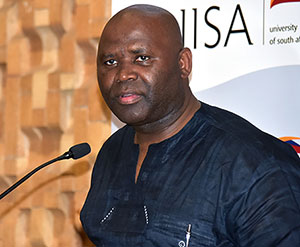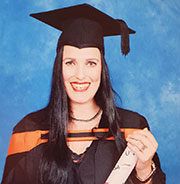

Dr Somadoda Fikeni, Director for Special Projects and Advisor to the Principal and Vice-Chancellor of Unisa.
This year marks the 42nd anniversary of Black Wednesday. To commemorate this day, the National Press Club, in partnership with the University of South Africa (Unisa) and the Qoboza family hosted the 9th Annual Percy Qoboza Memorial Lecture at the Senate Hall, Unisa Muckleneuk Campus. The theme for this year was media responsibility in the digital revolution and era of disinformation.
The lecture was delivered by Dr Somadoda Fikeni, Director for Special Projects and Advisor to the Principal and Vice-Chancellor of Unisa. In his speech, Dr Fikeni described Percy Qoboza as a passionate journalist who represents the finest, most courageous and intellectually gifted of African journalism which soared during the darkest days of apartheid and in face of adversity.
"If we were to caption Percy’s image it would be speaking piercing truth to brute power." His social history of growing up in Sophiatown, experiencing forced removal and destruction of his community, witnessing the Rivonia Trial, reporting on Soweto students’ riots and their massacre in June 1976, covering the killing of the Black Consciousness Movement leader, Steve Biko as well as numerous detentions by the apartheid security forces defined and moulded his deep conviction and organic embeddedness in his community.
Dr Fikeni credited Qoboza’s first-hand experience of suffering that gave him sharp insights into his writings and reflections. "What distinguished him and gave him an authentic voice was his organic embeddedness in his community of the oppressed masses, hence he had such a sharp grasp of the African condition under the apartheid system."
He also said that during the apartheid era the enemy was brutal and identifiable, and therefore the lines were drawn for those who were for or against the regime even when its propaganda machinery tried its best to disguise its covert operations.
Putting a spotlight on the current crop of journalists, Fikeni said that when examining the current issue of digital revolution, mass communication and disinformation within the context of democratic systems with constitutionally enshrined freedom of expression and press freedom, it is difficult to identify the fault lines.
"Failure of media to put equal scrutiny on big corporates and the whole network of social infrastructure of norms, values, culture, languages and definition of public spaces as well as the character of our institutions, has created a legitimacy crisis that is now more evident in the digital era of mass media where people are able to respond," he added.
He furthermore said that the mainstream media has not shown sustained intense focus on corporate corruption in the same manner that it has done with the public sector or government – even when it is clear that the private and public sector have mutually corrupting influence. "The cases of big construction company collusion or corruption during the 2010 World Cup, Steinhoff, Bell Pottinger, Tiger Brand bread price fixing and KPMG are some of the prominent cases that have not received as much attention as those of political figures or state-owned companies, even though the case of damage to common public good and the ultimate influence on citizens or taxpayers could be established. Where companies such as Steinhoff, Bosasa, Mckensey, Oakbay of the Guptas and KPMG are involved in corruption, the media has shown more interest in exposing the lifestyles and families of black members involved in reported corruption. We are so obsessed with headlines that we have taken our attention away from what matters most."
Dr Fikeni’s address was followed by a panel discussion with William Bird, CEO of Media Monitoring Africa; Antoinette Slabbert, journalist; Mosidi Mokgete, PR practitioner; and Themba Sepotokele, former journalist and PR practitioner.
Prof Mandla Makhanya, Principal and Vice-Chancellor of Unisa, says in hosting the Percy Qoboza Memorial Lecture, Unisa, together with its stakeholders, he remembers the role of the courageous journalists, newspapers, anti-apartheid organisations and activists targeted by the apartheid regime in 1977. "We honour and salute these activists who sacrificed their freedom in their quest to inform the public about the realities of our country; and in the struggle for democracy," says Prof Makhanya.
The memorial lecture is held annually in commemoration of 19 October 1977, when the then apartheid government banned The World, Weekend World and other publications. The day was later referred to as Black Wednesday.

Sonja Ruppersberg-Blom who is this year’s NPC-Unisa bursary winner
Since the inauguration of the annual Percy Qoboza memorial lecture in 2011, the National Press Club also used the event to make a R12 000 bursary award to one of Unisa’s deserving Honours Media Studies students. For the past three years the bursary was named after one of the outstanding local journalists, Patrick Hlahla, who died in 2013. Patrick was a former Chair of the National Press Club and also an award-winning journalist who fearlessly followed in the footsteps of Percy Qoboza – driven by the same ideals of free speech and honest reporting.
Prof Daniel du Plessis said that it is also important to link this event to the bursary for our students because it demonstrates to them their link to history but also the same tradition of fearless journalism. "It makes them active participants of the event and history. In addition, it allows needy students the opportunity to complete and further their studies – empowering them in these difficult times to become active participants in the economy and as professionals," he concluded.
* By Edgar Rathelele, Senior Media Officer, Directorate of Institutional Advancement
Publish date: 2019-10-21 00:00:00.0